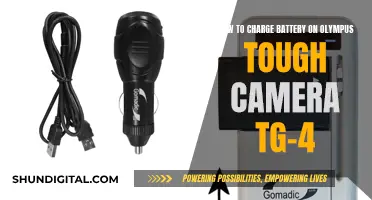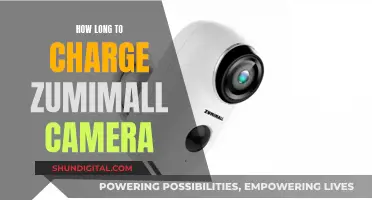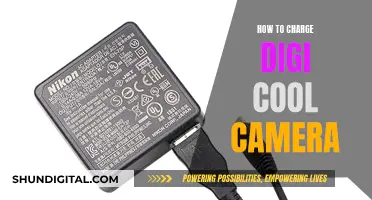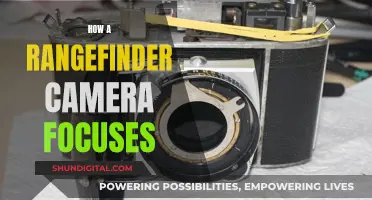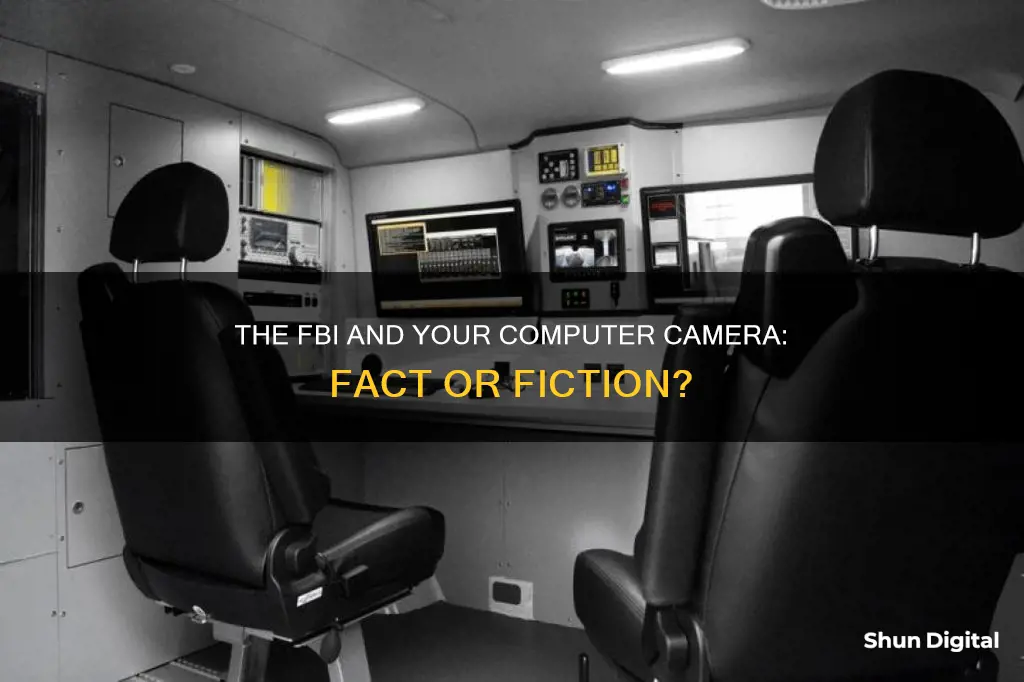
While it is technically possible for FBI agents to access your computer camera, it is unlikely that they are doing so unless you are a serious national security threat. In order to watch you via your webcam, the FBI would need a warrant, and even then, they are more likely to be interested in the data on your devices than your day-to-day activities. That being said, there have been instances of government agencies evading the need for a warrant and spying on citizens, such as the Snowden intelligence leak, where it was revealed that webcams and microphones were remotely activated without the subjects' knowledge.
| Characteristics | Values |
|---|---|
| Can FBI agents watch your computer camera? | Technically, yes, but they need a warrant to do so. |
| Are FBI agents interested in watching private citizens? | No, they are focused on national security threats. |
| When can FBI agents obtain a warrant to watch a private citizen? | When there is probable cause, such as an urgent threat or a national security issue. |
| What other ways can FBI agents access private citizen information? | Through data collection from big tech companies like Google and Facebook, and by using digital forensic tools. |
| How can citizens protect themselves from potential webcam surveillance? | By covering their webcam with tape or a sliding cover, enabling two-factor authentication, using strong passwords, and installing anti-spyware tools. |
What You'll Learn
- The FBI has previously been accused of using such techniques, but it's not spying on you
- The FBI would need a warrant to watch you via your webcam
- The FBI has the technical ability to watch your computer screen
- The FBI can engage in electronic surveillance without a warrant if it relates to national security and foreign intelligence
- If your webcam is hacked, it's not likely to be the FBI watching

The FBI has previously been accused of using such techniques, but it's not spying on you
The FBI's general ethos is to respect the privacy of individual citizens, and it is primarily focused on national security threats. However, there have been instances where the FBI and other agencies have overstepped their authority and spied on citizens without warrants. For example, in 2013, a report by the Washington Post revealed that the FBI had the ability to activate webcams for investigations, although a judge refused to grant permission for this. Additionally, the Snowden intelligence leak revealed that the government covertly collected and analysed private data, including remotely activating webcams and microphones.
While the FBI is not likely to be spying on you through your webcam, other entities may be. Hackers and cybercriminals can gain unauthorised access to your devices, and there have been reports of computer repair staff taking control of cameras. It is recommended that you take steps to secure your devices, such as using anti-spying tools, covering your webcam, and enabling two-factor authentication.
Charging Your GoPro Ultra HD Camera: A Step-by-Step Guide
You may want to see also

The FBI would need a warrant to watch you via your webcam
While the FBI has the technical capabilities to monitor your computer and phone, they are bound by strict privacy laws. In most cases, the FBI must obtain a search warrant before accessing a private citizen's devices. This means that the FBI would need a warrant to watch you via your webcam.
Law enforcement agencies need a compelling reason to obtain a warrant to access a citizen's computer. Usually, an urgent threat, such as harmful software or a possible terrorist attack, is justification for this.
Although the FBI has the ability to watch your computer screen, they have no interest in obtaining a search warrant to do so unless you are engaging in activities that constitute a national security threat.
There have been instances where the FBI has evaded procuring a search warrant and spied on citizens. For example, the Snowden intelligence leak revealed that the government covertly collected and analysed private data, with law enforcement agencies remotely activating webcams and microphones.
However, it's important to note that the FBI is most likely not spying on you through your webcam. As Tarah Wheeler, a cybersecurity fellow at New America, notes, "if you're in school and generally minding your own business, the FBI probably isn't watching you do your homework through your webcam."
Keep Your Camera Charged: Tips to Conserve Battery Power
You may want to see also

The FBI has the technical ability to watch your computer screen
It is true that the FBI has the technical ability to watch your computer screen. While the FBI does not actively monitor your computer or phone, they do possess the technical capabilities to do so. However, it is important to understand that they are bound by strict privacy laws and require a warrant to legally access a private citizen's devices. The FBI must have a compelling reason, such as an urgent threat or a national security issue, to obtain a warrant for electronic surveillance.
In certain exceptional cases, such as those involving national security and foreign intelligence, the FBI can engage in electronic surveillance without a warrant under the Foreign Intelligence Surveillance Act (FISA). Despite this, the general ethos of the FBI is to respect the privacy of individual citizens, and they are primarily focused on targeting significant national security threats rather than spying on private citizens.
While the FBI has the technical means to access your devices, it is important to remember that they are not interested in tracking law-abiding citizens. Unless you are engaging in activities that pose a threat to national security, the FBI has no interest in obtaining a search warrant to monitor your computer screen or online activities.
It is worth noting that there have been instances where government agencies, including the FBI, have secretly spied on citizens. For example, the Snowden intelligence leak revealed that government agencies had covertly collected and analysed private data, including remotely activating webcams and microphones without the knowledge of citizens. Additionally, the NSA's Optic Nerves program captured webcam images from Yahoo video chats for bulk surveillance.
To protect your privacy, it is recommended to take precautions such as covering your webcam, using anti-spying tools, and practising good digital security habits like enabling two-factor authentication and using strong passwords.
Waterloo's Camera Tickets: Origins and Insights
You may want to see also

The FBI can engage in electronic surveillance without a warrant if it relates to national security and foreign intelligence
The Foreign Intelligence Surveillance Act (FISA) was enacted in 1978 to regulate and oversee intelligence activities conducted within the United States for the purpose of gathering foreign intelligence. FISA establishes procedures for obtaining warrants for electronic surveillance, physical searches, and access to business records while protecting the privacy rights of U.S. citizens.
FISA permits electronic surveillance in two situations. Firstly, it authorises the President to use warrantless wiretapping if it relates to the protection of the United States against a grave attack, sabotage, or espionage, on the condition that no U.S. citizens are tapped. Secondly, federal law enforcement officials may obtain a warrant for foreign intelligence taps that do not meet the criteria of the first situation. To obtain the warrant, the FISA Court must find probable cause that the individual targeted is a foreign power or the agent of a foreign power and that a foreign power uses or will use the place to be tapped.
In addition, under FISA, the FBI can engage in electronic surveillance without a warrant if it relates to national security and foreign intelligence. This means that the FBI can monitor computers and phones without a warrant in the interest of national security and foreign intelligence. However, it is important to note that the FBI must adhere to strict privacy laws pertaining to citizens, especially regarding investigations, searches, and seizures.
While the FBI has the technical capability to monitor devices, they are generally required to obtain a search warrant before going through a private citizen's devices. A warrant can be obtained if there is probable cause and a compelling reason, such as an urgent threat or possible terrorist attack.
In summary, while the FBI has the capability and legal authority to engage in electronic surveillance without a warrant in specific circumstances, they are still bound by privacy laws and typically require a warrant for monitoring private citizens' devices.
Ft. Worth's Stance on Red-Light Camera Tickets
You may want to see also

If your webcam is hacked, it's not likely to be the FBI watching
The FBI has the technical capability to watch your computer screen, but they still need a warrant to do so. Unless you are engaging in activities that would constitute a national security threat, the FBI has no interest in obtaining a search warrant to watch your computer screen.
The FBI would need probable cause to obtain a warrant to search your phone. In the event of an arrest, FBI agents can see your computer desktop or laptop if they seize it and search its contents—again with a warrant. However, under the Foreign Intelligence Surveillance Act (FISA), the FBI can engage in electronic surveillance and computer screen monitoring without a warrant if it relates to national security and foreign intelligence.
The now-infamous Snowden intelligence leak revealed that the government covertly collected and analysed private data. Law enforcement agencies, like the FBI, even remotely activated webcams and microphones of unsuspecting citizens.
However, if your webcam is hacked, it's not likely to be the FBI watching. Former FBI Director James Comey covers his webcam, as does Mark Zuckerberg, and so do security experts. "As a society, we should be concerned about the increasing amount of surveillance and loss of privacy that we're experiencing," says Tarah Wheeler, a cybersecurity fellow at New America. "However, if you're in school and generally minding your own business, the FBI probably isn't watching you do your homework through your webcam."
Plus, Wheeler notes that the FBI would likely need a warrant to watch you via your webcam, and "to be honest, by the time the FBI has a warrant to surveil you, your webcam isn't your problem anymore."
The stories of compromised cameras are genuinely terrifying: hackers taunting people and spying on women at home, blackmailing teens into sharing nude photos, and schools even keeping watch on their students. "This is a pretty invasive, targeted form of malware, but the consequences can be super embarrassing," said Joseph Lorenzo Hall, chief technologist at the Center for Democracy and Technology.
How License Plate Readers Are Catching Speedsters
You may want to see also
Frequently asked questions
The FBI has the technical capability to watch you through your computer camera, but they are not interested in tracking private, law-abiding citizens. They require a warrant to monitor your computer camera, which they will only obtain if you are a national security threat.
Covering your computer camera is a smart privacy and security move. While the FBI is unlikely to be spying on you, there have been instances of hackers taunting people, spying on women, and blackmailing teens by accessing their webcams.
You can use masking tape, Post-it notes, or stickers to cover your computer camera. Alternatively, you can use plastic covers that flip open or away when you need to make a call.


